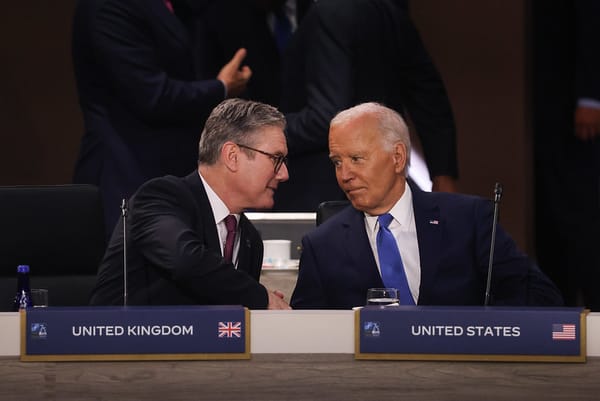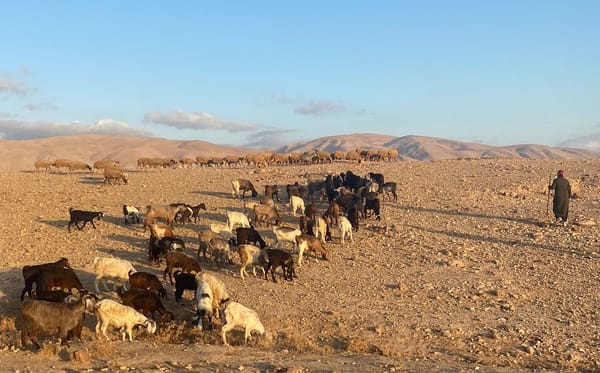The expropriation playbook: Offshore finance and the Israeli settler movement
Through a British legacy of financial secrecy, the Israeli settler movement has a way to avoid international regulation and sanction.

Last week, the EU and US announced new sanctions targeting Israeli settler entities alongside violent individuals. By imposing asset freezes on organisations – specifically Lehava and Hilltop Youth – and non-profit funds which raised money to support previously sanctioned settlers – Mount Hebron Fund and Shlom Asiraich – western governments have taken a step toward addressing the broader structures of the settler movement rather than taking on individuals one at a time.
On the surface, these asset freezes seem to indicate a firmer international commitment to ending the settlement movement. However, these measures are not aimed at truly dismantling the financial underpinnings of the settler undertaking. Instead, they operate as social deterrents, intended to shame Israel and its settlers to a return to the pre-7 October status quo, one of daily violence against Palestinians, without any outrage from foreign allies. These sanctions address neither the root cause behind Israel’s programme of Palestinian death and dispossession, nor the sanctioning countries own complicity in genocide and ethnic cleansing.
In the nearly three months since the first set of sanctions, settler-state violence in the occupied territories has only escalated. In fact, it’s possible to argue that in the short-term the sanctions have actually backfired for Palestinians: in direct response to these measures, National Security Minister Itamar Ben-Gvir ramped up efforts to remove any resistance to settler-state violence by forming a new police division to specifically target and arrest Israeli and international activists involved in documenting violence and providing a protective presence in Palestinian villages.
Beyond these initial dynamics, there is a sincere question of the general efficacy of financial sanctions. More optimistic commentators have noted that these measures do genuinely limit the ability of settlers to access the mainstream economy. After all, they freeze assets held in the sanctioning country and prohibit residents from making funds or financial services available to the sanctioned individual or entity. In doing so, the sanctions attempt to target international fundraising, which supplies millions of dollars to settler organisations. The sanctions also threaten the Israeli state’s ability to work openly with settlers.
However, this interpretation insufficiently integrates the fact that the settler economy is also an offshore economy. Settler movements leverage webs of shell companies registered in “secrecy jurisdictions” to facilitate massive transfers of illicit funds and shield their purchases of Palestinian property from prying eyes. As indicated by a 2023 UN report, financial sanctions often push the assets of sanctioned entities (such as those in the Israeli settler movement) further into the offshore economy, as these entities seek to evade the sanctions’ effects.
Seen through this lens, it becomes clear that the United Kingdom bears particular responsibility for the financial underpinnings of the settler movement. After all, this offshore system developed under Britain’s deliberate post-imperial stewardship.
A uniquely British history
Secrecy jurisdictions, also known as tax havens, are places that exist in regulatory vacuums. Individuals and companies can shift their wealth into these jurisdictions no matter where they physically reside or conduct their business. Crucially, they can feel secure in knowing that their assets will be safely beyond the grasp of the concerned public or any internal revenue service.
While one can look to Switzerland for the modern origins of such practices, the City of London is accountable for the offshore economy’s widespread capture of global capitalism. With the territorial British Empire crumbling and the post-war financial system dominated by the US dollar, bankers in the City sought ways to retain power in the 1950s and early 60s. They found a way forward in the Eurodollar: a new financial phenomenon in which European banks could accept deposits in dollars and lend them to great profit, all without any regulatory oversight. With the tacit approval of the Bank of England, London, above all other cities, became the home of the offshore dollar.
As Kojo Koram explains in Uncommon Wealth: Britain and the Aftermath of Empire, the rise of the London-based Euromarket ushered in a new purpose for the Empire’s financial hub in the age of decolonization: “London no longer had to be the ‘workshop of the world’, it could become the conductor of global capitalism, directing and distributing wealth worldwide, helping the rich keep their money out of reach of the covetous hands of those less fortunate.”
City bankers, lawyers, and accountants had immediate demand for such services. Threatened by the risk of taxation or nationalisation in newly or soon-to-be independent nations across the former Empire, British colonists endeavoured to quickly withdraw their personal assets and businesses out of Africa and Asia. However, mainland Britain – with its high post-war tax rates – was not desirable, either.
Fortunately for colonists afraid of non-white rule, not all of Britain’s imperial holdings became independent. Beginning with the Cayman Islands – a location well-suited for hiding dollars due to its proximity to America – Britain’s Crown Dependencies and Overseas Territories became offshore financial centres that would change the world. While operating with ostensible autonomy from Westminster they nonetheless retained the familiar backing of the Crown and English common law, inspiring confidence and comfort in potential clients while granting the financial services sector much greater room to manoeuvre and push regulatory boundaries.
Today, the UK and its overseas islands – including the Caymans, the British Virgin Islands (BVI), Bermuda, Gibraltar, Jersey, and Guernsey – are, together, the leading perpetrators of financial secrecy and tax evasion in the world, according to the Tax Justice Network’s most recent Financial Security Index. This spider’s web collectively accounts for over 10% of global financial secrecy, twice that provided by the US, and hides more than $85 billion in worldwide lost tax. Corruption, capital flight, and money laundering are the natural consequences. But as Koram writes, the offshore world “isn’t the secretive dark side of the system, in many ways it is the system.”
Financing dispossession
Israeli settlers seem to have a preference for the British nodes of the offshore network. The available snapshots of their involvement reveal that such secrecy jurisdictions are key to the movement of massive private donations into the hands of its nonprofits and for obscuring settler ownership of land and property.
In 2020, a BBC Arabic investigation revealed that between 2005 and 2018, four BVI-based companies donated over $100,000,000 to the Ir David Foundation, amounting to over half of the organisation’s donations during that period. The investigation revealed that Russian oligarch Roman Abramovich – sanctioned by the UK in the aftermath of Russia’s invasion of Ukraine – owned three of those companies and controlled the fourth.
Ir David Foundation – also known as Elad – is one of Israel’s wealthiest and most active settler organisations, operating with close links to the Jewish National Fund and the Israeli government. It is best known for running the City of David settlement and archeological tourism site in the Palestinian neighbourhood of Silwan, East Jerusalem while pursuing takeovers of Palestine property in an effort to ethnically cleanse the occupied city of Palestinian life. Here, Britain’s commitment to financial secrecy facilitated frictionless transfers of likely illicit funds from Russia into the occupied territories.
Meanwhile, Ateret Cohanim – a settler organisation that similarly aims to Judaize East Jerusalem – has also benefited from the offshore economy, but in a slightly different way. A 2010 Haaretz investigation found that Ateret Cohanim, among other settler non-profits, controlled multiple companies registered in Guernsey and the BVI. In these companies, Ateret Cohanim held property located in the Muslim Quarter of the Old City and in East Jerusalem. The Israel Land Administration appears to have transferred the property to the settlers without a tender and at a low price, a fact that all involved hoped to conceal.
Here, however, in a quirk of the offshore system something went wrong for the settlers, illustrating the full depth and absurdity of Britain’s complicity in the occupation.
Ateret Cohanim allowed the registration of its companies in the BVI to lapse without transferring their assets. In accordance with the local law, those assets then became property of the British Virgin Islands. In the case of one its companies – which Ateret Cohanim eventually re-registered a decade after its lapse – that meant that the government of a British Overseas Territory, for years, owned two settler-controlled apartments in the Old City’s Muslim Quarter.
The full extent of the settler offshore economy is not known; the system is working as intended. It’s clear, though, that a turn to the offshore has become the playbook for new attempts at land expropriation, including ongoing efforts to transfer 25% of the Old City’s Armenian Quarter to Jewish ownership. Settlers – including those affiliated with the now-sanctioned Hilltop Youth, and perhaps even Ateret Cohanim – are plainly supportive of the deal, and Jerusalemite Armenian activists suspect that the latter may ultimately be behind Xana Gardens Ltd, the Dubai-registered company to which the Armenian Patriarchate leased the land and property in 2021. It is not possible to truly know, however, as Dubai does not disclose company owners.
Challenging the economic order
As long as governments continue to outright oppose or drag their feet on transparency measures, such as public registers of beneficial ownership that provide the human owners of assets in a company or trust, there will always be escape routes through secrecy jurisdictions. This is not a special loophole just for Israeli settlers. Rather, settlers use the offshore economy just like everyone else, every day – this has become standard financial practice for individuals and organisations with enough money all around the world.
To genuinely dismantle the economic underpinnings of the settler movement requires a transformation of the global economy itself. As we have seen over the last six months, the genocide in Gaza and the ethnic cleansing throughout the occupied territories is partially a consequence of the failure of international systems of justice to offer meaningful resistance. Capitalism is at the core of this rot. Perhaps now is a time to look back to movements that challenged the economic order and integrate these demands in our resistance to the genocide in Gaza. Doing so leads to two immediate conclusions: anticapitalism must be anti-imperial, and it must support a free Palestine.▼
Evan Robins is an editor at Vashti.




